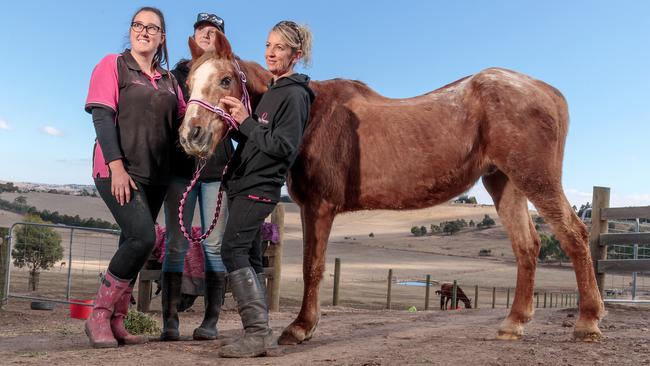Drought pushes Whittlesea horse rescue centre to the brink
Drought conditions have hit Whittlesea, with months of dry weather leaving dams and paddocks bare.

North
Don't miss out on the headlines from North. Followed categories will be added to My News.
A horse rescuer who saves “critically emaciated” animals says she fears her farm will go under as she battles the mounting mental and physical toll of months of dry paddocks and dams.
Cindy’s Promise Rescue and Rehab Inc Whittlesea owner Cindy Cattach issued a desperate plea on social media last week for financial donations to keep the group running.
WILDLIFE RESCUERS FEAR BURNOUT
WHITTLESEA STUDENTS FEEL BULLYING IMPACT
FOCUS ON INTEGRITY AND HORSE WELFARE MUST NOT WANE
Months of dry weather has forced the vet nurse of 25 years to buy water as well as hay and feed for the 32 horses in her care, at a cost of about $1200 a week.
“Times are really tough, actually the toughest they have ever been,” Ms Cattach said.
“Our dams are dry and paddocks are bare.
“The drought is really taking its toll on us both mentally and physically”.
A GiveEasy fundraiser page with a $10,000 target — enough money to buy about 60 bales of hay which would last about two months — had reached $6630, however Ms Cattach said the group needed a “miracle” to survive.
“Hay is like gold,” she said. “I don’t eat, I don’t sleep, I constantly worry.”
The number of people wanting to surrender horses to the charity had “tripled” in the past three months and the condition of horses being rescued was becoming increasingly dire, she said.
“We do specialise in very, very critically emaciated horses with zero body scores,” Ms Cattach said.
“Many of the ones we are seeing are almost dead on their feet.”
While the charity had previously been able to take in a new horse every time a rehabilitated one was adopted, now a new horse in need of urgent care was only accepted for every three adopted.
Ms Cattach vowed to “always look after” the existing horses in her care, some of which had severe deformities, however she said the future of the rescue group, and some of the state’s most neglected horses, was uncertain.


